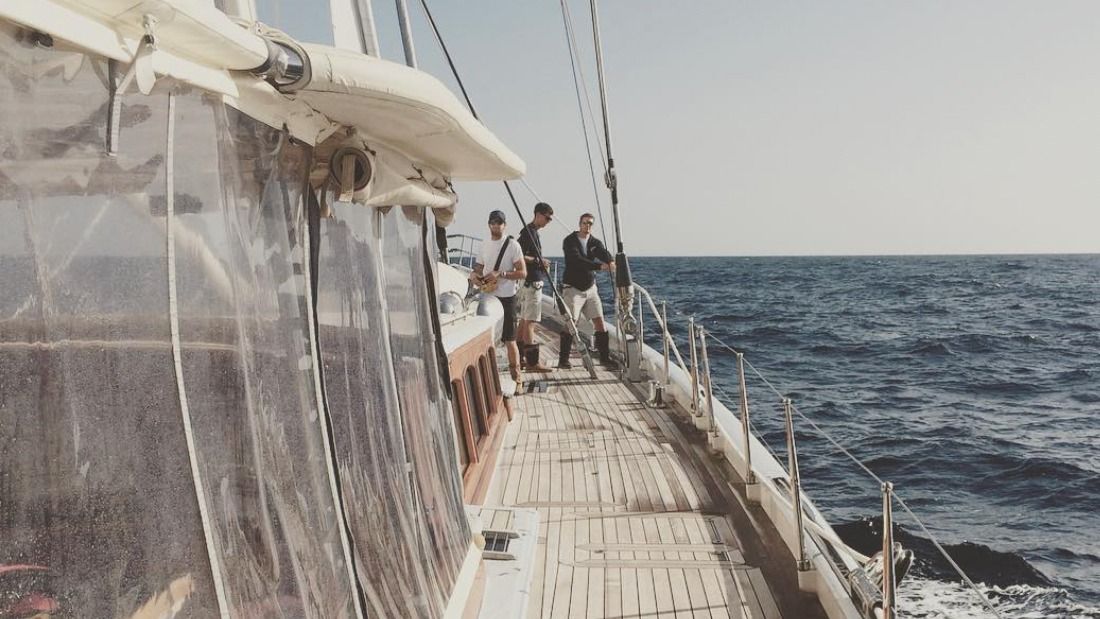

Alastair’s story: Two-time diagnosis of testicular cancer didn’t stop me
Living in Southampton and working as a professional yachtsman, for Alastair, sport was always a big part of his life. The idea of being diagnosed with testicular cancer was something he never imagined, especially when it came around twice.
In 2009, I felt a slight pain in my right testicle, but the pain went away so I put it down to a knock from sailing. A month later, I felt a lump which was tender to touch and more permanent. My girlfriend at the time suggested going to the doctors. I went to the GP and was immediately told to have an appointment at the hospital for check-ups. The whole process from GP to results was all quick and came like a hammer blow when they said I had teratoma testicular cancer in my left testicle.
For a year following the operation, I had to go to hospital for check-ups and tests, to make sure it hadn’t come back.
Then it happened. I was on my way home after being away at sea when I received a phone call from the clinical lead nurse. When he told me that the cancer had returned on the other side, it hit me like a freight train. I’d not had any symptoms and having felt great for a year, I thought I'd got through it. I broke down in tears.
" As men, we are too quick to dismiss a small thing in health that will lead to bigger things. "
I called my friend, Jim, from work. To this day I’ll never forget his words.
“Don’t worry matey, we’ll get through this!!”.
I broke down in tears again.
Prior to this, even though I'd spoken to colleagues, friends and family about my diagnosis, I always tried to put a brave face on to avoid letting people know I wasn’t okay. A mistake I won’t repeat.
The operation day arrived. I was in and out pretty quickly. At this point I want to do a shout out thank you to my friends Mik and Adam for helping me get through that day.
The next few years, tests and x-rays followed, along with one round of chemotherapy. I definitely saw myself as not ill and would often sit in the waiting area of the cancer clinic getting impatient and thinking 'if only they could put me through my tests and appointments quickly, then they could look after some of the people who really need help.'
I did have an illness, but I always felt that those who looked far worse than I did, needed more time than me. I see now that this was the wrong way to look at it.
I continued to endure the tests for five years, all whilst sailing and racing. I refused to let myself go into a shell, let this rule my life or dictate what I did in my career. This is something I believe is hugely important; remaining mentally strong and resilient during the inevitable lows.
Travelling back and forth from working on boats abroad to be tested was often a pain. But not once did I have to beg to go home. All the captains and other crew members were great in supporting me throughout.
The greatest feeling arrived several years ago, when I received an email from the hospital saying they were giving me the all clear. I emerged from my cabin with a huge smile and celebrated with my crew mates.
I would like to use this as an opportunity to say thank you to everyone who supported me throughout this time and continue to do so.
I believe that this support and the ability to talk to people were a huge part of me being able to remain mentally strong.
I also believe that I was hugely lucky to have my diagnosis early and that I had someone who forced me to go to the doctors. As men, we are too quick to dismiss a small thing in health that will lead to bigger things.
And finally, the fact that I remained fit and continued running and going to the gym was something that helped me to recover faster and become stronger for it; to the extent that I completed my first marathon and have got challenges to mark nine years clear and 14 years since my first diagnosis.
Here are my key lessons that I would like to share with you in the hope that it would benefit you if you were to get a similar diagnosis:
- Know your nuts. As with women and breast cancer, make sure you regularly check yourself.
- Keep a positive mindset.
- Keep yourself fit and healthy.
- Don’t let yourself become insular; accept lifts to hospital from friends or family.
- Give yourself goals, break down the time into more manageable pieces.
- Speak to friends and family, or at least make sure you know you can speak to them. This seems to be a pattern with men and their health. The biggest lesson I've learnt is saying you’re not okay, is definitely okay.
There is also a very happy ending to all this, my partner and I had a little boy last year who is about to turn one. Testicular cancer diagnosis is not the end of your world or journey, it’s just a different turn you’re about to take.
If you have any doubt about your health, please don’t delay in getting expert advice!
Have you checked your nuts? Use our check your testicles guide now.
If you, or someone you know is facing a testicular cancer diagnosis, check out Nuts and Bolts, which has the tools you need to confidently handle the testicular cancer journey; from diagnosis, to treatment, to life afterwards — we’ve got your back.